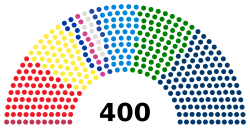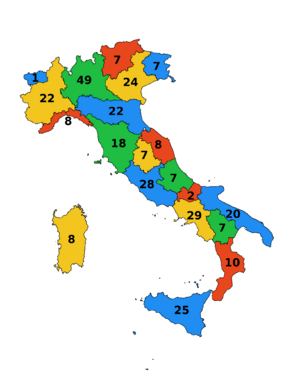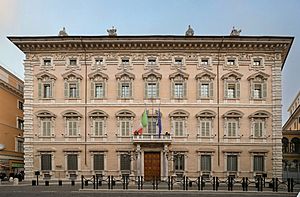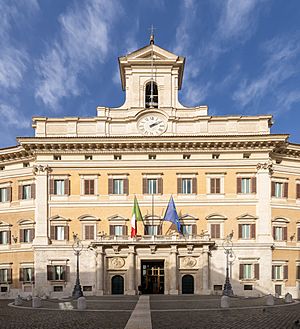Italian Parliament facts for kids
Quick facts for kids Italian ParliamentParlamento italiano |
|
|---|---|
| 19th legislature | |
 
Emblems of the Senate of the Republic and the Chamber of Deputies
|
|
| Type | |
| Type | |
| Houses |
|
| Leadership | |
|
President of the Senate
|
Ignazio La Russa (FdI)
Since 13 October 2022 |
|
President of the Chamber of Deputies
|
Lorenzo Fontana (Lega)
Since 14 October 2022 |
| Structure | |
| Seats |
|
 |
|
|
Senate of the Republic political groups
|
Government (120)
Opposition (85)
|
 |
|
|
Chamber of Deputies political groups
|
Government (244)
Opposition (156)
|
| Elections | |
|
Senate of the Republic last election
|
25 September 2022 |
|
Chamber of Deputies last election
|
25 September 2022 |
| Meeting place | |
| Chamber of Deputies: Palazzo Montecitorio Senate of the Republic: Palazzo Madama |
|
| Constitution | |
| Italian Constitution | |
The Italian Parliament (Parlamento italiano) is the main group of elected people who make laws for the Italian Republic. It represents all Italian citizens. This Parliament is like the updated version of older parliaments in Italy's history.
It is a bicameral legislature. This means it has two main parts, or "houses." These are the Chamber of Deputies and the Senate of the Republic. Together, they have 600 elected members. There are also a few unelected members called senatori a vita (senators for life).
The Chamber of Deputies has 400 members. They are called deputati. The Senate of the Republic has 200 elected members. They are called senatori. Plus, there are a few senators for life. These are either former Presidents or people chosen by the President for their great achievements.
Both houses work independently. They do not usually meet together. The Italian Constitution says they have the same powers. This is different from many other countries. A person cannot be a senator and a deputy at the same time.
Contents
What is the Italian Parliament?
The Italian Parliament is where important decisions for the country are made. It is the place where elected representatives from all over Italy come together. Their main job is to create and approve laws.
How is the Parliament Organized?
For a long time, the Parliament had more members. In 1963, the number was set. Later, in 2020, people voted to reduce the number of members. This change started with the 19th legislature.
Now, the Chamber of Deputies has 400 members. The Senate of the Republic has 200 elected members. This makes the Parliament smaller and more efficient.
Who Can Be a Member?
Besides the 200 elected members, the Senate also includes senators for life. These special members are:
- Former Presidents of Italy. They become senators for life automatically.
- Italian citizens chosen by the President of Italy. They are picked for their amazing work in science, art, or literature. There can be no more than five of these senators at one time.
To vote in Italy, you must be 18 years old or older. To become a Deputy, you must be 25 or older. To become an elected Senator, you must be 40 or older. There is no age limit for senators for life.
What Does the Parliament Do?
The Parliament has several very important jobs. Its main role is to make laws for Italy. It also checks on the government to make sure everything is running smoothly.
How Laws Are Made in Italy
For a new idea to become a law, both houses of Parliament must agree on the exact same text. Here's how it generally works:
- Proposal: An idea for a law is suggested.
- Discussion: A special committee and then the full house discuss and change the idea.
- Voting: Each part of the law is voted on, then the whole law.
- Agreement: Both houses must approve the exact same version.
- Promulgation: The President of Italy officially signs the law.
- Publication: The new law is announced to everyone.
Ideas for laws can come from the government, individual members of Parliament, or even regular citizens who gather 50,000 signatures. Regional councils and the National Council for Economics and Labour (CNEL) can also propose laws. Once an idea is proposed, a committee studies it. Then, it goes to the full house for discussion and voting. If one house approves it, it goes to the other house. If the second house makes changes, it goes back to the first. This continues until both houses agree. After both houses approve it, the President signs it, and it becomes law. This process is required for important laws, like those about the Constitution or the country's budget.
Changing the Constitution
The Italian Constitution is the country's most important rulebook. It is difficult to change, ensuring Italy's basic rules are stable. To change the Constitution, Parliament follows a special process. Both houses must approve the change twice. The second vote happens at least three months after the first. No new changes can be added in the second vote. If two-thirds of members in each house approve it, it becomes law immediately. If approved by a simple majority, but less than two-thirds, it is published. Then, citizens or MPs can ask for a referendum. If a referendum is held, people vote "Yes" or "No." If "Yes" wins, the change becomes law. If "No" wins, it does not. The "form of Republic" (Italy being a republic) can never be changed.
Keeping an Eye on the Government
Parliament also makes sure the government is doing its job well. Members of Parliament can ask the government questions. They ask if something is true and what the government plans to do. The government must answer. Parliament also holds "confidence votes." The government needs the trust of both houses to stay in power. If Parliament votes "no confidence," the government must resign. The President of Italy can then call for new elections.
Special Investigations
Sometimes, Parliament needs to investigate important public matters. It can create special committees for this. These committees can gather information and ask questions, much like a court. This helps Parliament ensure that everything is fair and transparent.
When Both Houses Meet Together
There are special times when the Chamber of Deputies and the Senate meet as one group. This is a "joint session." These meetings happen at Palazzo Montecitorio. The President of the Chamber of Deputies leads them. Joint sessions are for very important tasks:
- To elect the President of the Republic.
- To see the President take their oath of office.
- To elect some members for the High Council of the Judiciary.
- To elect some judges for the Constitutional Court.
Special Powers of the Parliament
The Italian Parliament has special rights. These rights help it work freely and independently from other parts of the government.
- Making its own rules: Each house can create its own rules for how it operates.
- Managing its own money: The Parliament decides how much money it needs. No other group can tell it how to spend its funds.
- Hiring its own staff: Each house manages its own offices and hires its own employees.
- Protecting its buildings: Police or other law enforcement can only enter Parliament buildings with permission. They cannot carry weapons inside.
Protecting Members' Freedom
Members of Parliament have special protections. These help Parliament work freely and independently. Members cannot be sued for what they say or how they vote in Parliament. This ensures they can speak their minds freely. Also, members cannot be searched or arrested without permission from their house. The only exception is if they are caught doing a very serious crime. These rules protect Parliament's freedom from outside interference.
How Members Are Elected
The way members of the Senate and Chamber of Deputies are chosen is set by a law from 2017. This law is often called the Rosatellum bis.
This system is a "mixed electoral system." This means some seats are won by direct vote in small areas. Other seats are given based on the percentage of votes parties get across larger areas.
Voting for Senators and Deputies
The Senate has 200 elected members. People aged 18 or older can vote for them. 74 senators are elected directly in specific areas. 126 senators are chosen based on party votes in each region. Four of these represent Italians living abroad. The Chamber of Deputies has 400 members. People aged 18 or older can vote for them. 147 deputies are elected directly in specific areas. 253 deputies are chosen based on party votes across the whole country. Eight of these represent Italians living abroad. When you vote, you pick a candidate. The parties supporting that candidate are also listed. For a party to get proportional seats, it usually needs at least 3% of the national vote.
Italians Living Abroad Vote Too
Italy is one of the few countries that reserves seats in Parliament for its citizens living in other countries. There are 8 seats in the Chamber of Deputies and 4 in the Senate for these overseas voters. This ensures that Italians living abroad also have a voice in their home country's government.
Who is in the Parliament Now?
The members of the Italian Parliament were last elected in September 2022. Here's a look at the current groups in each house.
Members of the Senate
The Senate of the Republic has these members after the 2022 general election:
| Coalition | Party | Seats | % | ||
|---|---|---|---|---|---|
| Centre-right coalition | Brothers of Italy | 66 | 32.5 | ||
| League | 29 | 15.0 | |||
| Forza Italia | 17 | 9.0 | |||
| Us Moderates | 2 | 1.0 | |||
| Total seats | 114 | 57.5 | |||
| Centre-left coalition | Democratic Party-IDP | 40 | 20.0 | ||
| Greens and Left Alliance | 4 | 2.0 | |||
| Total seats | 44 | 22.0 | |||
| Five Star Movement | 28 | 14.0 | |||
| Action - Italia Viva | 9 | 4.5 | |||
| South Tyrolean People's Party | 2 | 1.0 | |||
| South Calls North | 1 | 0.5 | |||
| Associative Movement of Italians Abroad | 1 | 0.5 | |||
| Total | 200 | 100 | |||
Members of the Chamber of Deputies
The Chamber of Deputies has these members after the 2022 general election:
| Coalition | Party | Seats | % | ||
|---|---|---|---|---|---|
| Centre-right coalition | Brothers of Italy | 119 | 29.7 | ||
| League | 66 | 16.5 | |||
| Forza Italia | 45 | 11.2 | |||
| Us Moderates | 7 | 1.7 | |||
| Total seats | 237 | 59.2 | |||
| Centre-left coalition | Democratic Party-IDP | 57 | 14.4 | ||
| Greens and Left Alliance | 12 | 3.0 | |||
| More Europe | 2 | 0.5 | |||
| Civic Commitment | 1 | 0.5 | |||
| Aosta Valley | 1 | 0.5 | |||
| Total seats | 68 | 17.0 | |||
| Five Star Movement | 52 | 13.0 | |||
| Action - Italia Viva | 21 | 5.2 | |||
| South Tyrolean People's Party | 3 | 0.7 | |||
| South Calls North | 1 | 0.5 | |||
| Associative Movement of Italians Abroad | 1 | 0.5 | |||
| Total | 400 | 100 | |||
See also
 In Spanish: Parlamento de la República Italiana para niños
In Spanish: Parlamento de la República Italiana para niños
- Constituent Assembly of Italy
- Politics of Italy
- Prime Minister of Italy
- Roman Senate
 | Misty Copeland |
 | Raven Wilkinson |
 | Debra Austin |
 | Aesha Ash |




